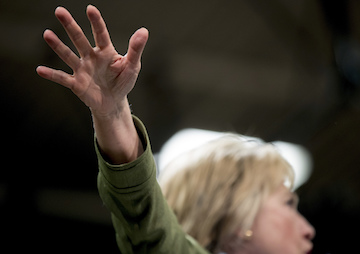Hillary Clinton and Her Hawks
Clinton’s speech accepting her party's nomination sidestepped the deep concerns anti-war Democrats have about her hawkish foreign policy, which is already taking shape in the shadows. 1
2
1
2

Hillary Clinton at a rally in Commerce City, Colo. (Andrew Harnik / AP)
As Hillary Clinton begins her final charge for the White House, her advisers are already recommending air strikes and other new military measures against the Assad regime in Syria.
The clear signals of Clinton’s readiness to go to war appears to be aimed at influencing the course of the war in Syria as well as U.S. policy over the remaining six months of the Obama administration. (She also may be hoping to corral the votes of Republican neoconservatives concerned about Donald Trump’s “America First” foreign policy.)
Last month, the think tank run by Michele Flournoy, the former Defense Department official considered to be most likely to be Clinton’s choice to be Secretary of Defense, explicitly called for “limited military strikes” against the Assad regime.
And earlier this month Leon Panetta, former Defense Secretary and CIA Director, who has been advising candidate Clinton, declared in an interview that the next president would have to increase the number of Special Forces and carry out air strikes to help “moderate” groups against President Bashal al-Assad. (When Panetta gave a belligerent speech at the Democratic National Convention, he was interrupted by chants from the delegates on the floor of “no more war!”
Flournoy co-founded the Center for New American Security (CNAS) in 2007 to promote support for U.S. war policies in Iraq and Afghanistan, and then became Under Secretary of Defense for Policy in the Obama administration in 2009.
Flournoy left her Pentagon position in 2012 and returned to CNAS as Chief Executive Officer. She has been described by ultimate insider journalist David Ignatius of the Washington Post, as being on a “short, short list” for the job Secretary of Defense in a Clinton administration.
Last month, CNAS published a report of a “Study Group” on military policy in Syria on the eve of the organization’s annual conference. Ostensibly focused on how to defeat the Islamic State, the report recommends new U.S. military actions against the Assad regime.
Flournoy chaired the task force, along with CNAS president Richard Fontaine, and publicly embraced its main policy recommendation in remarks at the conference.
She called for “using limited military coercion” to help support the forces seeking to force President Assad from power, in part by creating a “no bombing” zone over those areas in which the opposition groups backed by the United States could operate safely.
In an interview with Defense One, Flournoy described the no-bomb zone as saying to the Russian and Syrian governments, “If you bomb the folks we support, we will retaliate using standoff means to destroy [Russian] proxy forces, or, in this case, Syrian assets.” That would “stop the bombing of certain civilian populations,” Flournoy said.
In a letter to the editor of Defense One, Flournoy denied having advocated “putting U.S. combat troops on the ground to take territory from Assad’s forces or remove Assad from power,” which she said the title and content of the article had suggested.
But she confirmed that she had argued that “the U.S. should under some circumstances consider using limited military coercion – primarily trikes using standoff weapons – to retaliate against Syrian military targets” for attacks on civilian or opposition groups “and to set more favorable conditions on the ground for a negotiated political settlement.”
Renaming a ‘No-Fly’ Zone
The proposal for a “no bombing zone” has clearly replaced the “no fly zone,” which Clinton has repeatedly supported in the past as the slogan to cover a much broader U.S. military role in Syria.
Panetta served as Defense Secretary and CIA Director in the Obama administration when Clinton was Secretary of State, and was Clinton’s ally on Syria policy. On July 17, he gave an interview to CBS News in which he called for steps that partly complemented and partly paralleled the recommendations in the CNAS paper.
“I think the likelihood is that the next president is gonna have to consider adding additional special forces on the ground,” Panetta said, “to try to assist those moderate forces that are taking on ISIS and that are taking on Assad’s forces.”
Your support matters…Independent journalism is under threat and overshadowed by heavily funded mainstream media.
You can help level the playing field. Become a member.
Your tax-deductible contribution keeps us digging beneath the headlines to give you thought-provoking, investigative reporting and analysis that unearths what's really happening- without compromise.
Give today to support our courageous, independent journalists.






You need to be a supporter to comment.
There are currently no responses to this article.
Be the first to respond.